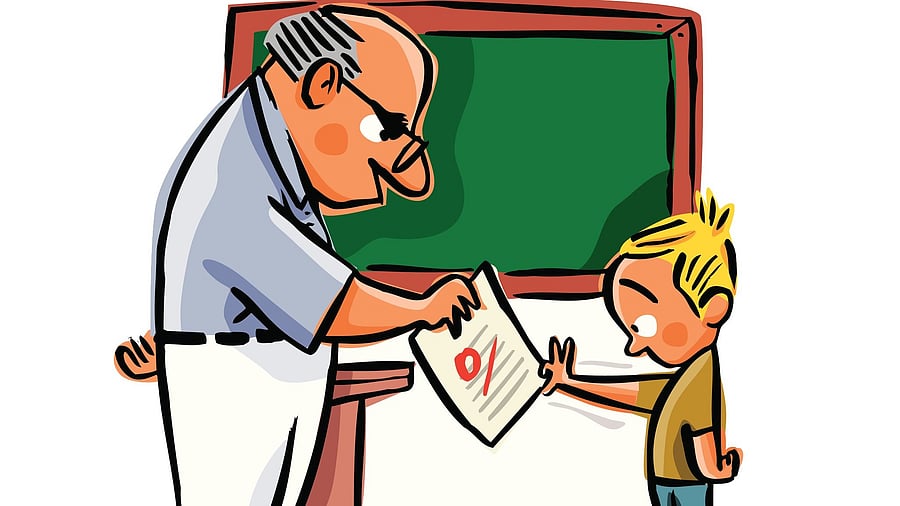
According to the principles of serve and return, whenever the learners express an inquisitiveness by action, observation, or words, the teacher must step up to satisfy their need for curiosity.
Credit: Special arrangement
In education and child psychology, ‘serve and return’ concept describes the importance of positive, responsive interactions between children and adults. It applies to student life and learning.
According to the principles of serve and return, whenever the learners express an inquisitiveness by action, observation, or words, the teacher must step up to satisfy their need for curiosity. Interestingly, expressing a ‘wow’ when looking at a rainbow in the sky or throwing a ‘tantrum’, can allow children to learn and grow.
When students do not follow essential class agreements, they test the boundaries with their teacher. When they pause to absorb the beauty of a rainbow, they maybe craving to learn the science behind this phenomenon. Almost all of the growing-up behaviour, irrespective of the external tone that they may carry, can be seen from the prism of serve and return.
The takeaway for the teachers: the synapse the learner attempts to make, through positive or negative behaviour patterns, should never be refused, addressed, mocked at or left unattended. The role of the teacher is to maintain consistent positive language, acceptance, and encouragement.
Positive language includes, but is not limited to, careful word selection, mindful facial expressions, and responsible body gestures and questions. The teacher must view all behaviour responsibly because neglect can impact young learners’ uninhibited sense of inquiry and in-class participation.
The serve-and-return principle is based on positive interactions and experiences between the student and the teacher, built organically over time.
Psychology of students
Human behaviour is a fascinating field of study. Experts trace the roots of adult human behaviour to their childhood experiences. They feel the foundations for adult characteristics, such as level of motivation, interests, goals, intentions, desires, social attitudes, personal responses, and professional habits, are determined in the early childhood.
The child’s needs can be divided broadly into physiological, safety, social, intellectual, exploatory, spiritual and psychollogical. Spiritual needs for children can be simplified into self-actualisation tasks that contain a sense of accomplishment and happiness within themselves.
The takeaway for teachers here is that before they begin planning their students’ academic path, they must first spend considerable time understanding their specific class groups and the students’ journeys before they come to them.
Although needs within a certain age bracket can be generalised, teachers might want to consider that each child is unique. Also, great variations can often be observed in batch-wise behaviour and attitudes.
What lack of encouragement can do
The immediate environment in which the learner resides and operates is paramount. Students develop their sense of self, confidence, discovery, emotional balance, and social needs in this environment.
Adults, parents, and educators shoulder most of the responsibility during the growing-up years. They are the primary role models for emotional behaviour, social behaviour, and etiquette.
The takeaway for teachers is to focus on developing a sense of security and trust in their students through carefully selected words, actions, and support programmes. They should also build strong relationships with other caregivers, parents, and educators in the student’s life.
The opposite of encouragement is not a lack of boundary lines. Safe and consistent rules and agreements support the learners in feeling secure and allow them to experiment within acceptable and safe limitations.
Allowing students to be themselves
It is natural for students to assert themselves, because they want to make their own choices. Adults sometimes snub them and do not allow them to do so.
The outcome of this control in early childhood has a long-term impact on the children’s adult lives. They will tend to hold themselves back in making decisions. Takeaway for teachers: carefully guide students to make their own informed choices
Students have varied expectations from education, usually shaped by how society perceives success. Often, it takes students a long time to ‘uncondition’ themselves and ‘realise’ what they want from education. This realisation dawns upon them because of life experiences and exposure.
Teachers should honour students’ life experiences and realisations. Another important element that impacts students’ confidence and happiness is acknowledgement. Since acknowledgement fuels motivation, teachers should extend full-hearted acknowledgement.
(The writer is an educator, consultant and columnist)